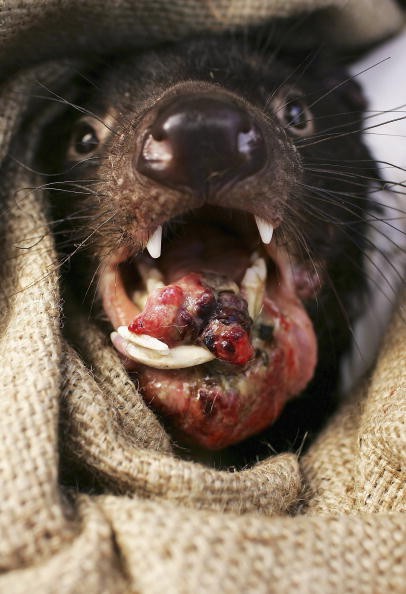By Dane Lorica, | August 31, 2016

Tasmanian devil with DFTD.
A genetic study has revealed that the Tasmanian devil is undergoing rapid evolution to enable the animal to adapt to a contagious face cancer.
The infectious face cancer, which affects Tasmanian devils, has slashed nearly 80 percent of their population foin r the past 20 years. In response to the threat of extinction, University of Tasmania scientists discovered that genetic changes have been occurring among the animals.
Like Us on Facebook
The Devil Facial Tumor Disease (DFTD) spreads quickly and easily because of the devil's constant love nips. During interactions especially when coupling, the ferocious carnivores bite each other's face, thus resulting in the transmission of cancer cells, BBC explained.
Facial deformation and growths are common signs of the disease. Devils usually die six months after acquiring the infection.
Genomicist Paul Hohenlohe of the University of Idaho has highlighted that genes play a vital role in cancer risk and immune function. Hohenlohe emphasized that the presence of particular genes would either fight the cancer cells, provide resistance against the infection or extend the survival period of the devil for reproduction
Another genomicist Kathy Belov of the University of Sydney thought that the "devils are learning to live with the disease." The Verge reported that identification of genes necessary to prolong survival may help scientists in selective breeding of Tasmanian devils to prevent their extinction.
Tasmanian devils are important players in the ecosystem. They devour decaying cadavers in the environment. Their extinction might result in an influx of feral cats and foxes to an area, which may lead to the spread of Toxoplasmosis.
The findings of the study have been published in the Journal Nature Communications.
-
Use of Coronavirus Pandemic Drones Raises Privacy Concerns: Drones Spread Fear, Local Officials Say

-
Coronavirus Hampers The Delivery Of Lockheed Martin F-35 Stealth Fighters For 2020

-
Instagram Speeds Up Plans to Add Account Memorialization Feature Due to COVID-19 Deaths

-
NASA: Perseverance Plans to Bring 'Mars Rock' to Earth in 2031

-
600 Dead And 3,000 In The Hospital as Iranians Believed Drinking High-Concentrations of Alcohol Can Cure The Coronavirus

-
600 Dead And 3,000 In The Hospital as Iranians Believed Drinking High-Concentrations of Alcohol Can Cure The Coronavirus

-
COVID-19: Doctors, Nurses Use Virtual Reality to Learn New Skills in Treating Coronavirus Patients







